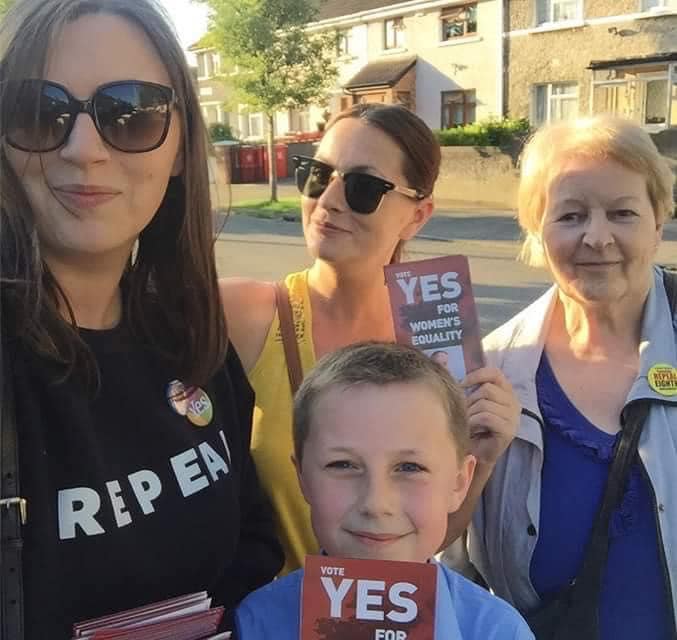Women’s View has been little-utilised by historians, despite being an invaluable resource for understanding the concerns and ideas of generations of women who were not willing to put up with the Ireland they were living in.
The magazine was launched by Sinn Féin – The Workers’ Party in 1980. It covered everything from harassment in the workplace to union updates, reports from women’s groups in working class communities, reflections on the failed campaign against the Eighth Amendment, the treatment of single mothers, and the experience of Chilean refugees.
Margaret O’Leary was editor, organiser, treasurer and distribution manager. Her story is one of many female activists who formed the backbone of parties, organisations and movements. And yet somehow get left out of the tall tales of the revolutionary past told in Ireland’s pubs.

Born in 1947, O’Leary was the second of four children. She described a happy childhood growing up on Upper St Columba’s Road, Drumcondra.
The revitalised and left-moving politics of the Republican Movement inspired her and she joined in 1968. Her older brother Jer had also joined but as he had kept it a secret, the two surprised each other with their membership.
Activism
She threw herself into the work of the organisation, including campaigns like the Dublin Housing Action Committee. When the Provisionals split in 1969-70, O’Leary supported Official Sinn Féin and the socialist direction. She would later tell the authors of The Lost Revolution that she had felt “we were leaving the conservative rear-guard behind and moving on”.
O’Leary supported NICRA’s nonviolent campaign for civil rights and political reform in Northern Ireland. As state repression and sectarian violence grew, she took part in solidarity actions, including peaceful but high-profile events with Seán Ó Cionnaith and others.
In the mid-1970s O’Leary began to work as a full-timer for the party. Initially working in administration and accounts, she would go on to work full-time for the weekly Irish People newspaper.
In 1978 she was part of the Irish delegation to the World Festival of Youth and Students and on her return she became a founding member of the Ireland Cuba Friendship Society. The following year she stood as a local election candidate in the Drumcondra Ward, polling nearly 500 votes.

It is clear that O’Leary believed that the party and movement must be democratic in the here and now, and not just when the revolution comes. Speaking of the secretive Industrial Department and their ability to forgo normal party work, she told The Lost Revolution that “I wasn’t interested in a second layer of so-called intellectuals. [It was seen as] sort of alright for people in the cumanns to go out and do the slogging work while the other people made the decisions.”
She outlined her concerns at Bodenstown in 1979, saying “We must ensure that the Workers’ Party is not used by self-minded people as a bandwagon for their personal ambitions and selfish pursuits. We do not want people who will wait until the moment of victory before admitting their membership of our Party. We need women and men, girls and boys, who will work openly and be proud to be known as members of the Workers’ Party in their workplaces, in their unions, in their local associations.”
‘Taking a step back’
In 1974 Margaret met Frank Cassidy, who she married in 1980, and they would go on to have two daughters together, Lorna and Jennifer. As the girls were growing up O’Leary took a step back from some of her usual day-to-day activism.
It is a sign of her level of activity, that ‘taking a step back’ included working in the head office, representing the Women’s Committee, running Women’s View, and – after her family moved to Finglas – being an active member in the Dublin North West constituency. A dedicated anti-sectarian, she joined with the Peace Train movement in opposition to nationalist paramilitaries repeatedly bombing the Dublin to Belfast trainline.
Not only did O’Leary stay with the Workers’ Party following the Democratic Left split in 1992, in the months preceding the split she acted as shop steward for the party workers and refused to back down when their jobs were put at risk.
She finished up as a Workers’ Party full-timer in 1993 and in 1995 began working for the Irish Council for Social Housing (ICSH), staying there for 25 years. Even though she was meant to be on holiday, O’Leary dropped into the ICSH for ‘one quick job’ on the day she died in November 2020.
At her funeral her comrades recalled that “Margaret was serious in her political beliefs. She was not a strident, shouting from a soup-box type of person but she was resolute in her beliefs and led her life in accordance with her political principles.”
–
A number of issues of Women’s View are available on the Irish Left Archive.





